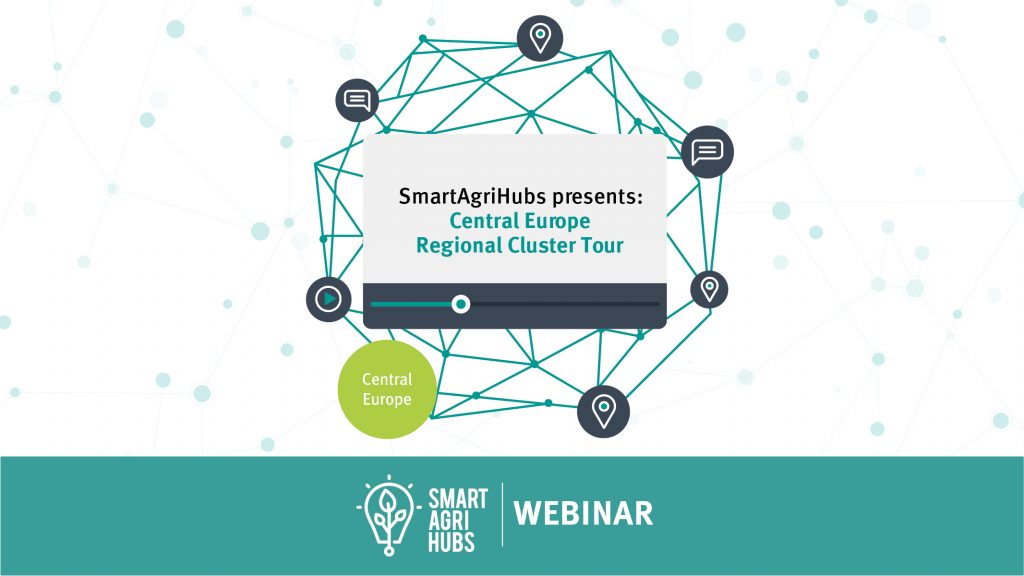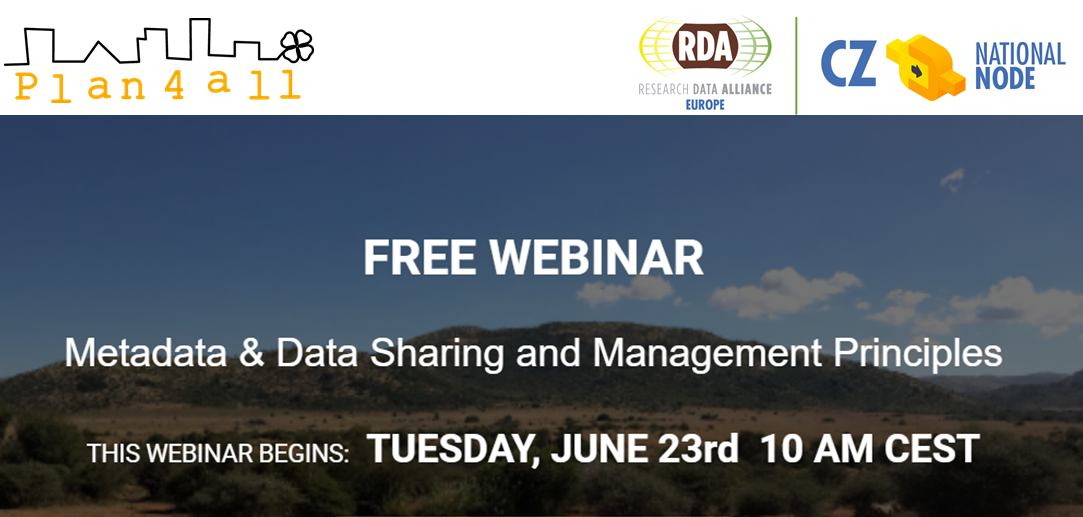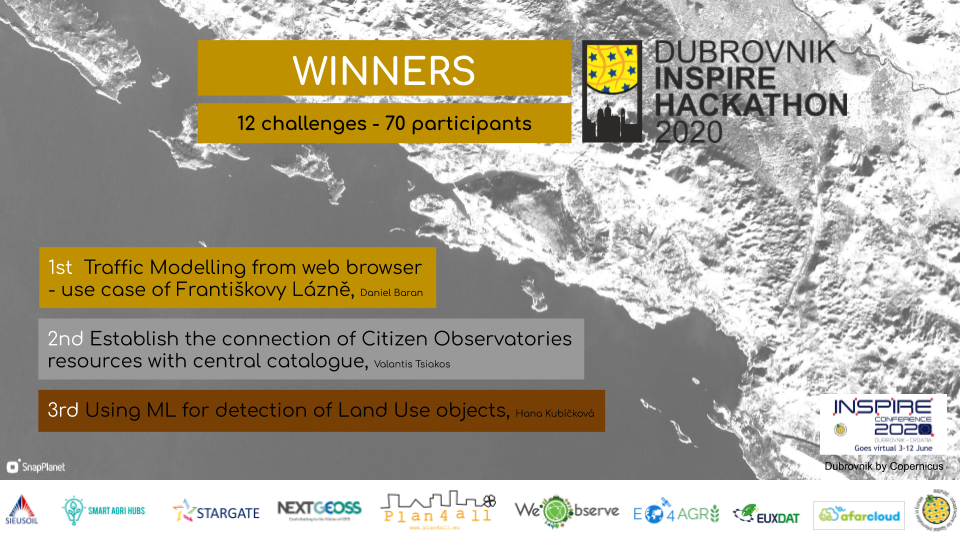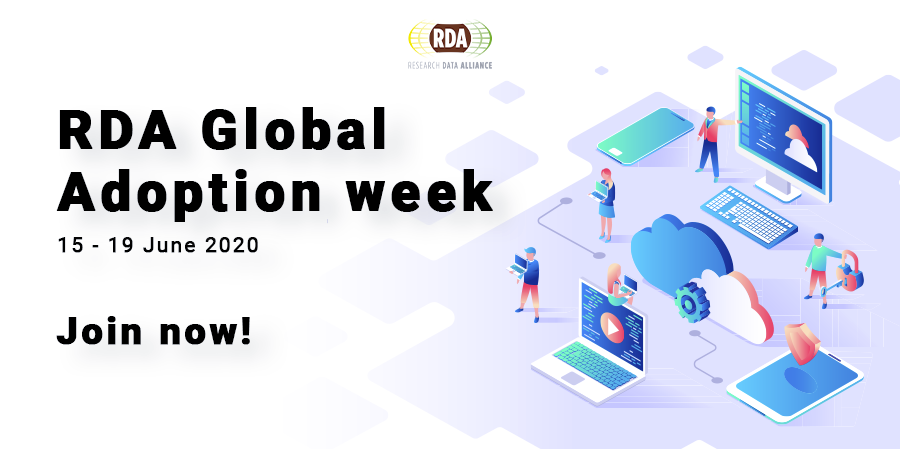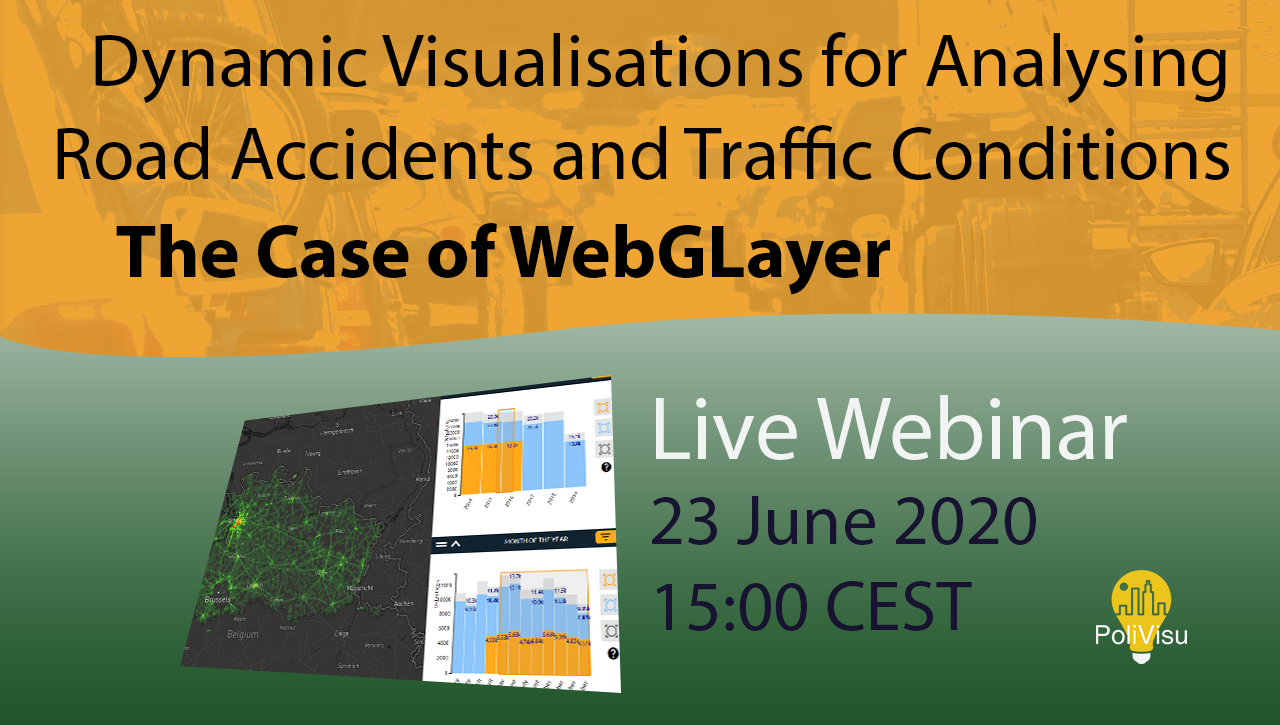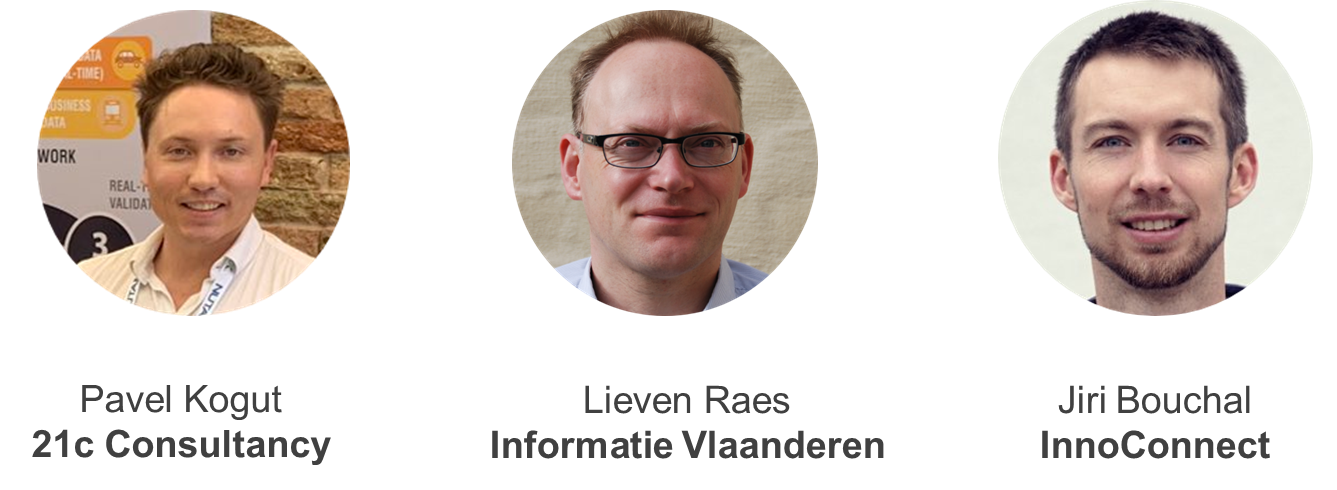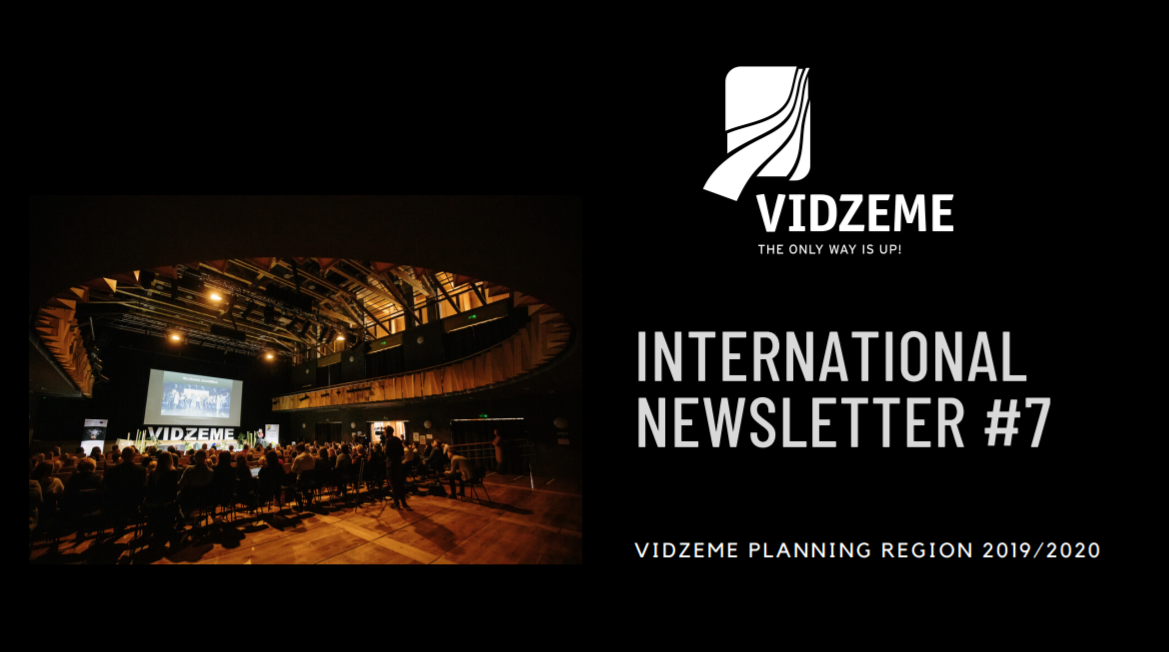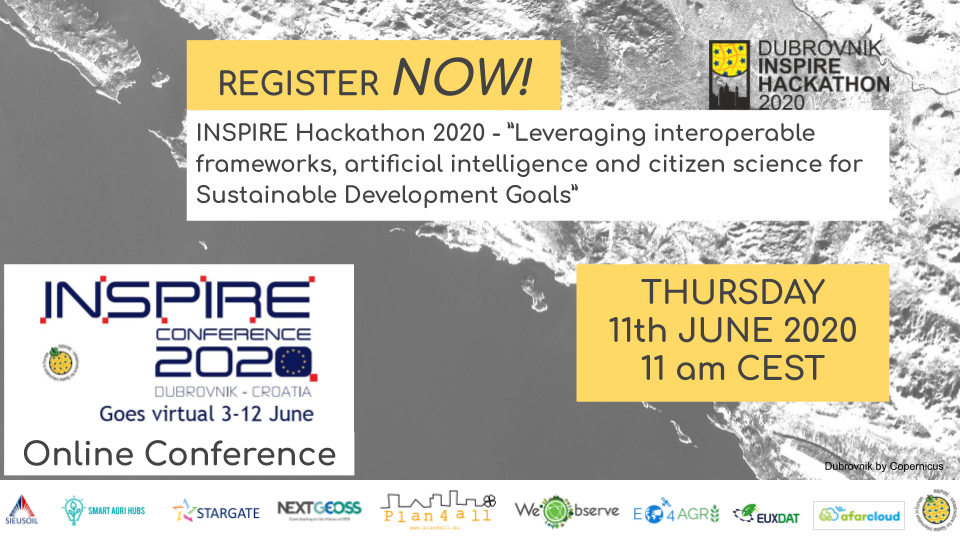
Dubrovnik INSPIRE Hackathon 2020 – ”Leveraging interoperable frameworks, artificial intelligence and citizen science for Sustainable Development Goals”
This is the fifth year of the INSPIRE Hackathon, an integral part of the INSPIRE conference and workshops. On Thursday 11th June 11:00 am CEST, the results from the hackathon challenges will be presented showing what the teams have achieved in the weeks of virtual collaboration. The workshop will conclude with an announcement of the top three teams in an awards ceremony.
REGISTER for the event HERE Thursday 11th June 11:00 am CEST
The INSPIRE Hackathon 2020 is in line with the motto of the INSPIRE Conference – “Bringing sustainability and digitalisation together”. The hackathon is co-organised and supported by 10 partners: Plan4all, WeObserve, NextGEOSS, EO4agri, EUXDAT, Sieusoil, Stargate, SmartAgriHubs, AFarCloud, INSPIRE. The Dubrovnik INSPIRE hackathon organization is led by Plan4all and consists of 12 individual challenges this year.
Citizen science
The goal of the hackathon is to promote collaboration and sharing of experience in the domain of spatial data/services and citizen-science while showcasing their utilisation and uptake to different application domains and themes. This includes supporting the Sustainable Development Goals. The H2020 WeObserve project (https://www.weobserve.eu/) that aims to create a sustainable ecosystem for Citizen Observatories for environmental monitoring and improve coordination between related regional, european and international activities has been a main contributor.
4 out of 12 challenges are addressing different aspects of citizen science data:
- Integrating INSPIRE with Citizen Science and EO authentication systems
- Establish the connection of Citizen Observatories resources with central catalogue
- Improve interoperability between methods for sharing in-situ and citizen-sourced data
- Interchangeable map compositions in support of collaborative spatial intelligence
Artificial intelligence
There is an increasing interest in developing digital ecosystems for the environment focussing not only on data and infrastructures but also on algorithms, analytics, insights and applications. Artificial intelligence is an area of technology that has great potential to support the Sustainable Development Goals, as any other area of society. In the Dubrovnik INSPIRE hackathon we have the following challenges related to AI.
- Using ML for detection of Land Use objects
- Deep learning for weather forecast
Sustainable Development Goals – Food Security
Food security is one of the Sustainable Development Goals that is easy to understand for us all. We all need food. Food security is global in nature because the agricultural sector and industry is global. The H2020 project EO4agri is collecting input for their policy advise to the EC for future development of agricultural infrastructure, data and platform requirements and more. The following challenges will provide valuable input to the EO4agri input as well as to the INSPIRE community.
- EO4Agri Ideathon
- Assessing phenological events (sowing/planting, emergence, end of season…) in agriculture based on Copernicus data
- Copernicus and LPIS data combined in data cube services
- Using Sentinel 1 data and IoT technology for analysis of soil moisture
Interoperable frameworks and open data
In general, the INSPIRE hackathons are all about promoting use of data, particularly open data from Copernicus and GEO, contributing to making the data interoperable following standards like INSPIRE, OGC, ISO etc. In addition to the SDG Food security we address also traffic and land use, both components in several SDGs.
- Traffic Modelling from web browser – use case of Františkovy Lázně
- Extend OpenLandUse by selected Inspire Data Theme
Jury evaluation
More than 70 participants have contributed to these 12 challenges and their results are evaluated by an international experts jury.
Meet the jury members:
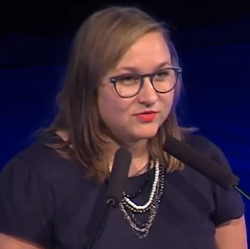 Jitka Faugnerova is the INSPIRE Member State Contact point for the Czech Republic in the Czech Environmental Information Agency, CENIA, where she is responsible for practical implementation of INSPIRE Directive: support for data providers, dissemination activities (organisation of technical and legislative workshops for INSPIRE stakeholders, coordination of public consultations to INSPIRE regulations) as well as for the transposition of INSPIRE Directive into the Czech law. She graduated from the Faculty of Civil Engineering of Czech Technical university. Jitka has had several commissions of trust related to the INSPIRE directive.
Jitka Faugnerova is the INSPIRE Member State Contact point for the Czech Republic in the Czech Environmental Information Agency, CENIA, where she is responsible for practical implementation of INSPIRE Directive: support for data providers, dissemination activities (organisation of technical and legislative workshops for INSPIRE stakeholders, coordination of public consultations to INSPIRE regulations) as well as for the transposition of INSPIRE Directive into the Czech law. She graduated from the Faculty of Civil Engineering of Czech Technical university. Jitka has had several commissions of trust related to the INSPIRE directive.
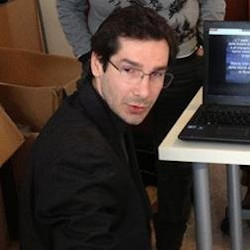 Stefano Tamascelli graduated from the school of Software Engineering of the Padua University (Italy) in 2000. I has obtained a PhD degree in Artificial Intelligence and Neural Networks from the University of Padua in 2003. Stefano Tamascelli is the Managing Partner of XTeam Software Solutions, has designed and developed over 100 commercial products for Amiga, Windows, MacOs, Linux, Nintendo GameBoy Advance, Nintendo DS, Android, iOS, Flash, HTML5 and has worked on other projects/videogames as a consultant for Xbox, Xbox360, XBox One Playstation 2, Playstation 3, PlayStation 4 , PlayStationVita, Nintendo3DS, Nintendo Switch. He has also lead all the research projects of the company, such as GeniuX Photo EFX (award-winning photo editing software), 3D GeniuX, Extender (augmented reality awnings for outdoor ), the Retaliation series for Forgotten Empires, The Ballad Singer and have a consolidated experience in H2020 projects with the participation on 6 projects ( 3D TuneIn, SCENT, PLUGGY, MCI, MCI2, Victor ). Now he is working on artificial intelligence for the dementia’s study and to improve the listen experience of people with hearing loss / cochlear implants.
Stefano Tamascelli graduated from the school of Software Engineering of the Padua University (Italy) in 2000. I has obtained a PhD degree in Artificial Intelligence and Neural Networks from the University of Padua in 2003. Stefano Tamascelli is the Managing Partner of XTeam Software Solutions, has designed and developed over 100 commercial products for Amiga, Windows, MacOs, Linux, Nintendo GameBoy Advance, Nintendo DS, Android, iOS, Flash, HTML5 and has worked on other projects/videogames as a consultant for Xbox, Xbox360, XBox One Playstation 2, Playstation 3, PlayStation 4 , PlayStationVita, Nintendo3DS, Nintendo Switch. He has also lead all the research projects of the company, such as GeniuX Photo EFX (award-winning photo editing software), 3D GeniuX, Extender (augmented reality awnings for outdoor ), the Retaliation series for Forgotten Empires, The Ballad Singer and have a consolidated experience in H2020 projects with the participation on 6 projects ( 3D TuneIn, SCENT, PLUGGY, MCI, MCI2, Victor ). Now he is working on artificial intelligence for the dementia’s study and to improve the listen experience of people with hearing loss / cochlear implants.
 Alexander Kotlev is an experienced researcher with a long track record of projects and research interests spanning across multiple domains such as IoT, citizen science, data interoperability, standard-based web services, spatio-temporal data and GIS. Alex joined the JRC in 2012 where he is working on the technological enablers for data-driven innovation across multiple domains and levels of governance. Alex has hands-on experience in the use of open source and proprietary ETL tools, digital mapping technologies, spatial databases, Python and OGC Standards. He has a strong education background and holds a Doctor of Philosophy in GISCience (Ph.D.)
Alexander Kotlev is an experienced researcher with a long track record of projects and research interests spanning across multiple domains such as IoT, citizen science, data interoperability, standard-based web services, spatio-temporal data and GIS. Alex joined the JRC in 2012 where he is working on the technological enablers for data-driven innovation across multiple domains and levels of governance. Alex has hands-on experience in the use of open source and proprietary ETL tools, digital mapping technologies, spatial databases, Python and OGC Standards. He has a strong education background and holds a Doctor of Philosophy in GISCience (Ph.D.)
REGISTER for the event HERE Thursday 11th June 11:00 am CEST

